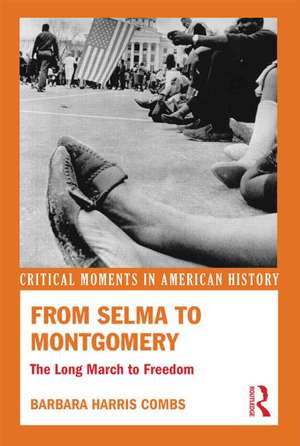From Selma to Montgomery: The Long March to Freedom: Critical Moments in American History
Autor Barbara Harris Combsen Limba Engleză Paperback – 19 noi 2013
In five concise chapters bolstered by primary documents including civil rights legislation, speeches, and news coverage, Combs introduces the Civil Rights Movement to undergraduates through the courageous actions of the freedom marchers.
| Toate formatele și edițiile | Preț | Express |
|---|---|---|
| Paperback (1) | 351.66 lei 6-8 săpt. | |
| Taylor & Francis – 19 noi 2013 | 351.66 lei 6-8 săpt. | |
| Hardback (1) | 764.20 lei 6-8 săpt. | |
| Taylor & Francis – 26 noi 2013 | 764.20 lei 6-8 săpt. |
Din seria Critical Moments in American History
-
 Preț: 311.26 lei
Preț: 311.26 lei -
 Preț: 287.37 lei
Preț: 287.37 lei -
 Preț: 280.80 lei
Preț: 280.80 lei -
 Preț: 295.77 lei
Preț: 295.77 lei -
 Preț: 311.03 lei
Preț: 311.03 lei -
 Preț: 365.87 lei
Preț: 365.87 lei -
 Preț: 347.80 lei
Preț: 347.80 lei -
 Preț: 348.00 lei
Preț: 348.00 lei - 17%
 Preț: 239.59 lei
Preț: 239.59 lei -
 Preț: 366.85 lei
Preț: 366.85 lei -
 Preț: 364.94 lei
Preț: 364.94 lei -
 Preț: 350.68 lei
Preț: 350.68 lei -
 Preț: 368.33 lei
Preț: 368.33 lei -
 Preț: 369.73 lei
Preț: 369.73 lei -
 Preț: 349.71 lei
Preț: 349.71 lei -
 Preț: 362.05 lei
Preț: 362.05 lei -
 Preț: 363.00 lei
Preț: 363.00 lei -
 Preț: 351.66 lei
Preț: 351.66 lei -
 Preț: 350.68 lei
Preț: 350.68 lei -
 Preț: 362.05 lei
Preț: 362.05 lei -
 Preț: 364.94 lei
Preț: 364.94 lei -
 Preț: 364.94 lei
Preț: 364.94 lei -
 Preț: 384.59 lei
Preț: 384.59 lei - 18%
 Preț: 1001.07 lei
Preț: 1001.07 lei -
 Preț: 350.68 lei
Preț: 350.68 lei -
 Preț: 379.80 lei
Preț: 379.80 lei -
 Preț: 351.66 lei
Preț: 351.66 lei - 18%
 Preț: 1001.07 lei
Preț: 1001.07 lei - 18%
 Preț: 1003.30 lei
Preț: 1003.30 lei
Preț: 351.66 lei
Nou
Puncte Express: 527
Preț estimativ în valută:
67.31€ • 70.00$ • 56.40£
67.31€ • 70.00$ • 56.40£
Carte tipărită la comandă
Livrare economică 14-28 martie
Preluare comenzi: 021 569.72.76
Specificații
ISBN-13: 9780415529600
ISBN-10: 0415529603
Pagini: 240
Ilustrații: 5 halftones
Dimensiuni: 152 x 229 x 18 mm
Greutate: 0.34 kg
Ediția:New.
Editura: Taylor & Francis
Colecția Routledge
Seria Critical Moments in American History
Locul publicării:Oxford, United Kingdom
ISBN-10: 0415529603
Pagini: 240
Ilustrații: 5 halftones
Dimensiuni: 152 x 229 x 18 mm
Greutate: 0.34 kg
Ediția:New.
Editura: Taylor & Francis
Colecția Routledge
Seria Critical Moments in American History
Locul publicării:Oxford, United Kingdom
Public țintă
UndergraduateCuprins
1. One Moment in Time 2. Portrait of a Nation 3. Everyday People 4. America's Bloody Sunday 5. Aftermath. Documents.
Notă biografică
Barbara Harris Combs is Assistant Professor of Sociology and Southern Studies at the University of Mississippi.
Recenzii
1. Stephen Middleton, Mississipp State University
The focus on the Selma March and its connection to the Voting Rights Act of 1965 is intriguing. Also, the investigator promises to include minor figures in the book, which is equally appealing.
2. Tracy K'Meyer, University of Louisville
I do think that there is a growing need for relatively short books for lower division college classes. I also think there is a growing demand for courses on race and civil rights movement. My courses in those subjects fill up every semester.
3. Clarence Lange, Illinois State University
This text would be useful in survey-level African American history courses (which generally meet General Education requirements and would attract large enrollments); as well as upper-level undergraduate courses (and perhaps much smaller graduate seminars) on Civil Rights and Black Power in the 1950s-60s, or Civil Rights and the Law.
With the explosion in literature on the modern Civil Rights/Black Power movements (e.g., the field of "Black Freedom Studies"), the market for this type of book has indeed grown. Most history departments and Black Studies/Ethnic Studies departments have such courses "on the books," so to speak, and they generally attract consistently large numbers of undergraduate and graduate students alike.
On the plus side, the author(s) focus their attention on the movement’s lesser known local activists, which rightfully de-centers national figures such as Martin Luther King, Jr., in the movement’s narrative. Moreover, linking the Selma-to-Montgomery March and the 1965 Voting Rights Act to contemporary discussions of the Voting Rights Act’s legacies (especially with regard to Latino voters and immigration), is a timely and important scholarly intervention.
"With admirable insight, Barbara Combs nicely frames and examines the great significance of the Selma campaign. She not only places this high point of the Civil Rights Movement into an historical context but equips us to understand the ripple effects of this ‘moment in time,’ especially as relevant to the quality of contemporary American citizenship and the franchise."
– Todd C. Shaw, author of Now is the Time! Detroit Black Politics and Grassroots Activism
"[Barbara Combs] focuses attention on the movement’s lesser known local activists, which rightfully de-centers national figures such as Martin Luther King, Jr., in the movement’s narrative. Moreover, linking the Selma-to-Montgomery March and the 1965 Voting Rights Act to contemporary discussions of the Voting Rights Act’s legacies is a timely and important scholarly intervention."
—Clarence Lang, author of Grassroots at the Gateway: Class Politics and Black Freedom Struggle in St. Louis, 1936-75
"Barbara Harris Combs offers a complex and nuanced approach to the study of the 1965 march to Montgomery, Alabama, in the context of black Americans’ freedom struggles. From Selma to Montgomery is a wonderfully crafted tool for both history and sociology undergraduate classrooms, and a scaffold from which to teach interdisciplinary methodology, thinking, and questioning.”
-David Ponton III, Rice University, USA in The Journal of Southern History
The focus on the Selma March and its connection to the Voting Rights Act of 1965 is intriguing. Also, the investigator promises to include minor figures in the book, which is equally appealing.
2. Tracy K'Meyer, University of Louisville
I do think that there is a growing need for relatively short books for lower division college classes. I also think there is a growing demand for courses on race and civil rights movement. My courses in those subjects fill up every semester.
3. Clarence Lange, Illinois State University
This text would be useful in survey-level African American history courses (which generally meet General Education requirements and would attract large enrollments); as well as upper-level undergraduate courses (and perhaps much smaller graduate seminars) on Civil Rights and Black Power in the 1950s-60s, or Civil Rights and the Law.
With the explosion in literature on the modern Civil Rights/Black Power movements (e.g., the field of "Black Freedom Studies"), the market for this type of book has indeed grown. Most history departments and Black Studies/Ethnic Studies departments have such courses "on the books," so to speak, and they generally attract consistently large numbers of undergraduate and graduate students alike.
On the plus side, the author(s) focus their attention on the movement’s lesser known local activists, which rightfully de-centers national figures such as Martin Luther King, Jr., in the movement’s narrative. Moreover, linking the Selma-to-Montgomery March and the 1965 Voting Rights Act to contemporary discussions of the Voting Rights Act’s legacies (especially with regard to Latino voters and immigration), is a timely and important scholarly intervention.
"With admirable insight, Barbara Combs nicely frames and examines the great significance of the Selma campaign. She not only places this high point of the Civil Rights Movement into an historical context but equips us to understand the ripple effects of this ‘moment in time,’ especially as relevant to the quality of contemporary American citizenship and the franchise."
– Todd C. Shaw, author of Now is the Time! Detroit Black Politics and Grassroots Activism
"[Barbara Combs] focuses attention on the movement’s lesser known local activists, which rightfully de-centers national figures such as Martin Luther King, Jr., in the movement’s narrative. Moreover, linking the Selma-to-Montgomery March and the 1965 Voting Rights Act to contemporary discussions of the Voting Rights Act’s legacies is a timely and important scholarly intervention."
—Clarence Lang, author of Grassroots at the Gateway: Class Politics and Black Freedom Struggle in St. Louis, 1936-75
"Barbara Harris Combs offers a complex and nuanced approach to the study of the 1965 march to Montgomery, Alabama, in the context of black Americans’ freedom struggles. From Selma to Montgomery is a wonderfully crafted tool for both history and sociology undergraduate classrooms, and a scaffold from which to teach interdisciplinary methodology, thinking, and questioning.”
-David Ponton III, Rice University, USA in The Journal of Southern History
Descriere
On March 7, 1965, a peaceful voting rights demonstration in Selma, Alabama, was met with an unprovoked attack of shocking violence that riveted the attention of the nation. In the days and weeks following "Bloody Sunday," the demonstrators would not be deterred, and thousands of others joined their cause, culminating in the successful march from Selma to Montgomery. The protest marches led directly to the passage of the Voting Rights Act of 1965, a major piece of legislation, which, ninety-five years after the passage of the Fifteenth Amendment, made the practice of the right to vote available to all Americans, irrespective of race. From Selma to Montgomery chronicles the marches, placing them in the context of the long Civil Rights Movement, and considers the legacy of the Act, drawing parallels with contemporary issues of enfranchisement.
In five concise chapters bolstered by primary documents including civil rights legislation, speeches, and news coverage, Combs introduces the Civil Rights Movement to undergraduates through the courageous actions of the freedom marchers.
In five concise chapters bolstered by primary documents including civil rights legislation, speeches, and news coverage, Combs introduces the Civil Rights Movement to undergraduates through the courageous actions of the freedom marchers.














